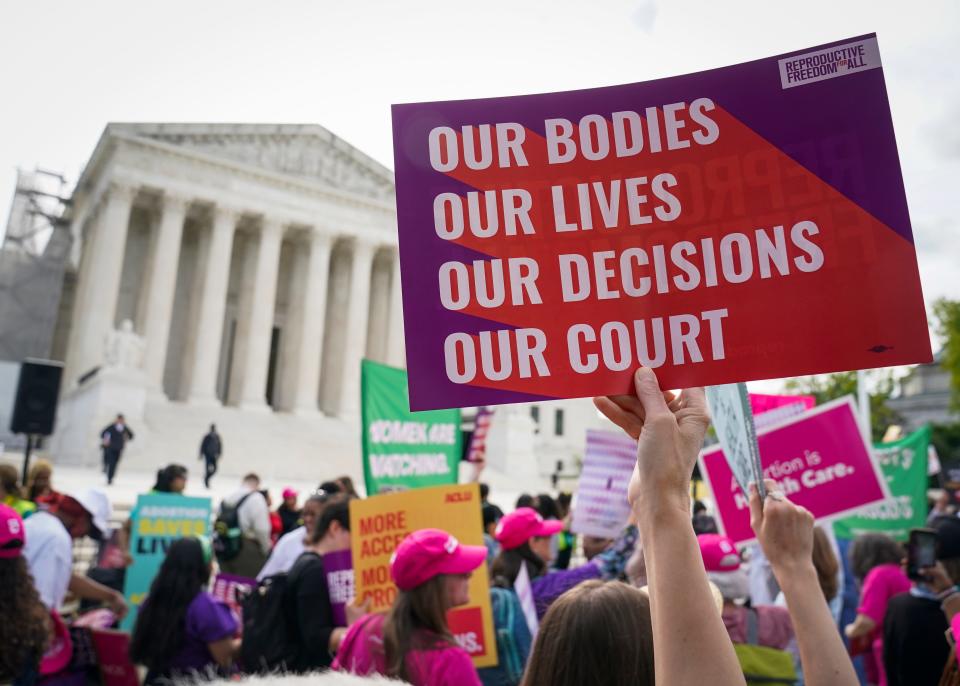Will Trump back abortion bans? What happens if he loses in 2024? 5 TIME interview takeaways
WASHINGTON — With Election Day less than 200 days away, former President Donald Trump revealed what his possible second term could look like, doubling down on his signature immigration, tax and foreign policy proposals and making clear what he would do differently if elected again.
In an exclusive interview with TIME magazine published Tuesday, the former president said he wants to pursue a gristly conservative agenda that includes using the U.S. military to deport 11 million undocumented immigrants; deploying the National Guard to quash protests; gutting the U.S. civil service; enforcing conditions for U.S. support and more, according to the outlet.
The presumptive Republican nominee also argued that he made a critical mistake when he first arrived in the White House in 2017: He was too generous.
"The advantage I have now is I know everybody. I know people," Trump said. "I know the good, the bad, the stupid, the smart. I know everybody."
Though Trump has previously spoken about his plans for a second term and has sprinkled these ideas at his rallies, the TIME Magazine sit down is arguably his most exhaustive interview on the subject should he defeat President Joe Biden.
Here are five takeaways from the conversation.
Trump claims U.S. has 'no choice' but mass deportation
Much like the 2016 campaign that ushered Trump into office with promises to build a southern border wall, his 2024 bid is largely fueled by fears about immigration and the migrants traveling to the U.S.-Mexico border seeking refuge.
Trump has blitzed Biden over the issue, charging that the Democratic incumbent is not just responsible for the crisis, but unable to get it under control. Last fiscal year, U.S. Customs and Border Protection recorded 2.5 million encounters at the border – the highest 12-month total ever.
A second Trump administration would pursue a policy of kicking out 11 million people who came to the country illegally. The former president said he would pursue building migrant detention camps and use the U.S. military at the border and inland.
"Because we have no choice. I don't believe this is sustainable for a country, what's happening to us," Trump said.
However, the former president earlier this year rejected a bipartisan border deal that a group of senators, including GOP Sen. James Lankford, R-Okla., negotiated for months. Republican lawmakers quickly abandoned the deal following Trump's criticism.
Abortion: No federal ban but OK with strict state rules

On the campaign trail, Trump often takes credit for nominating three of the Supreme Court justices who voted to overturn Roe v. Wade.
But given the victories Democrats have notched at the ballot box in recent years as they've campaigned on protecting abortion rights, Trump has recently pumped the brakes on supporting a national prohibition.
"You don’t need a federal ban," he told TIME.
But what if Congress passed one? Trump was skeptical the Senate could ever reach the needed 60-vote threshold. Yet he didn't promise to veto such legislation either, as conservative allies continue to pursue larger anti-abortion goals.
"We have a long way to go," he said.
Trump was largely agnostic when asked about his personal views on state rules, such as monitoring pregnancies or prosecuting a person for having an abortion, but he said he feels Florida's 6-week ban was "too severe."
"It’s irrelevant whether I’m comfortable or not," Trump said. "It's totally irrelevant, because the states are going to make those decisions."
What if Trump loses in 2024?
Looming over the 2024 contest is the Jan. 6, 2021 insurrection, when a mob of the former president's supporters stormed the U.S. Capitol as lawmakers tried to certify Biden as the winner of the last White House election.
Trump still doesn't accept losing the 2020 race to Biden, and he repeats that lie often in interviews and at rallies. Although he remains confident in prevailing this fall without any violence, what would happen if Trump fails to recapture the White House?
"And if we don't win, you know, it depends. It always depends on the fairness of an election," Trump told Time, not dismissing the possibility of further violence around the 2024 election.
That answer is bound to add more anxiety to the country's political atmosphere.
A CBS/YouGov poll released in January, for instance, found where more than two-thirds of voters believe U.S. democracy is under threat. Almost a majority think there will be violence from the losing side, the survey found.
Using the National Guard to quell crime and protests
Crime remains a poignant selling point for the Trump campaign, which leverages it both in terms of talking about migrants coming into the country and the recent uptick of college campus protests against the war in Gaza.
"I would use certainly the National Guard, if the police were unable to stop. I would absolutely use the National Guard," he said of those demonstrations.
Trump dismissed statistics showing violent crime is down throughout the country. Homicides specifically dropped by 13% in 2023, according to the FBI.
But the former president rebuffed those figures, saying without evidence the agency's numbers are "fudged" and "faked."
Trump specifically called attention to images of shoplifting that have infuriated many voters, saying the country must work to give "police back the power and respect" they deserve.
Helping NATO allies, criticizing Netanyahu

Given the multiple international clashes that have entangled the U.S. as of late, Trump's worldview on America's role has come further into focus.
Much like on the campaign trail, Trump emphasized in the TIME interview how the U.S. will come to the aid of its allies should they be attacked.
America, he said, will "try and help Ukraine" if he is reelected. But it will have stipulations based on other countries paying their fair share to international alliances.
"Europe has to pay," he said. "We are in for so much more than the European nations. It's very unfair to us."
NATO members are asked to spend at least 2% of their GDP on defense. Not all members have reached this goal, fueling Trump's criticism of the alliance.
What may surprise some onlookers is Trump's criticism of Israel and its handling of the war with Hamas. He claimed the major U.S. ally has a bad public relations campaign by sending out too many images of the death and destruction in Gaza.
Trump also had sharp words for Israeli Prime Minister Benjamin Netanyahu, who he blamed for not preventing the Oct. 7, 2023 attack and for pulling out of a U.S.-led operation to assassinate a top Iranian general in 2020.
"I had a bad experience with Bibi," he said.
Contributing: David Jackson and Lauren Villagran, USA TODAY
This article originally appeared on USA TODAY: What if Donald Trump wins? 5 takeaways from TIME magazine interview
